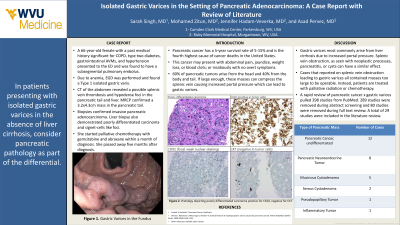Monday Poster Session
Category: Biliary/Pancreas
P1495 - Isolated Gastric Varices in the Setting of Pancreatic Adenocarcinoma: A Case Report and Review of Literature
Monday, October 23, 2023
10:30 AM - 4:15 PM PT
Location: Exhibit Hall

Has Audio
.jpg)
Sarah Singh, MD
West Virginia University-Camden Clark Medical Center
Parkersburg, WV
Presenting Author(s)
Sarah Singh, MD1, Mohamed Zitun, MD2, Jennifer Hadam-Veverka, MD2, Asad Pervez, MD2
1West Virginia University-Camden Clark Medical Center, Parkersburg, WV; 2West Virginia University, Morgantown, WV
Introduction: Pancreatic cancer is the fourth leading cause of cancer death in the United States. Common presentations include abdominal pain, weight loss, or a sudden onset of painless jaundice. Bleeding, in particular from varices, is a rare presentation. We present a case of pancreatic cancer presenting as isolated gastric varices with a review of the literature.
Case Description/Methods: A 66-year-old female with a past medical history significant for gastrointestinal bleeding secondary to arteriovenous malformations (AVM) of both the small bowel and colon treated with argon photocoagulation (APC) presented to the emergency department complaining of shortness of breath and chest pain radiating to her right jaw. She was diagnosed with a pulmonary embolism and started on therapeutic anticoagulation. She was also found to be anemic on admission, so an esophagogastroduodenoscopy (EGD) and colonoscopy were performed. A 2-3cm AVM was noted in her stomach. She was transferred to a tertiary care center for further evaluation and treatment of the AVM. The repeat EGD found an isolated gastric varix instead of an AVM. A CT of the abdomen revealed an ill-defined mass in the tail of the pancreas and multiple liver lesions suspicious for metastatic disease. Biopsies obtained via endoscopic ultrasound revealed pancreatic adenocarcinoma. Palliative chemotherapy was started following discharge.
Discussion: Gastric varices most commonly arise from liver cirrhosis. After examining 41 studies involving splenic vascular compromise, it was found that isolated gastric varices may arise due to a multitude of pancreatic disorders as well as cancers of the stomach, colon, or kidney. These pancreatic disorders included acute, chronic, or autoimmune pancreatitis, pancreatic neoplasms, mucinous or serous adenomas, and pseudocysts. Previous case reports on gastric varices secondary to splenic vein obstruction due to pancreatic cancer all contained masses too large to be operable. As such, treatment for pancreatic cancer is dependent on whether there is local spread. Ultimately, we present this case to bring awareness to isolated gastric varices and to expand the differential to include pancreatic cancer, especially if seen in the absence of liver cirrhosis.

Disclosures:
Sarah Singh, MD1, Mohamed Zitun, MD2, Jennifer Hadam-Veverka, MD2, Asad Pervez, MD2. P1495 - Isolated Gastric Varices in the Setting of Pancreatic Adenocarcinoma: A Case Report and Review of Literature, ACG 2023 Annual Scientific Meeting Abstracts. Vancouver, BC, Canada: American College of Gastroenterology.
1West Virginia University-Camden Clark Medical Center, Parkersburg, WV; 2West Virginia University, Morgantown, WV
Introduction: Pancreatic cancer is the fourth leading cause of cancer death in the United States. Common presentations include abdominal pain, weight loss, or a sudden onset of painless jaundice. Bleeding, in particular from varices, is a rare presentation. We present a case of pancreatic cancer presenting as isolated gastric varices with a review of the literature.
Case Description/Methods: A 66-year-old female with a past medical history significant for gastrointestinal bleeding secondary to arteriovenous malformations (AVM) of both the small bowel and colon treated with argon photocoagulation (APC) presented to the emergency department complaining of shortness of breath and chest pain radiating to her right jaw. She was diagnosed with a pulmonary embolism and started on therapeutic anticoagulation. She was also found to be anemic on admission, so an esophagogastroduodenoscopy (EGD) and colonoscopy were performed. A 2-3cm AVM was noted in her stomach. She was transferred to a tertiary care center for further evaluation and treatment of the AVM. The repeat EGD found an isolated gastric varix instead of an AVM. A CT of the abdomen revealed an ill-defined mass in the tail of the pancreas and multiple liver lesions suspicious for metastatic disease. Biopsies obtained via endoscopic ultrasound revealed pancreatic adenocarcinoma. Palliative chemotherapy was started following discharge.
Discussion: Gastric varices most commonly arise from liver cirrhosis. After examining 41 studies involving splenic vascular compromise, it was found that isolated gastric varices may arise due to a multitude of pancreatic disorders as well as cancers of the stomach, colon, or kidney. These pancreatic disorders included acute, chronic, or autoimmune pancreatitis, pancreatic neoplasms, mucinous or serous adenomas, and pseudocysts. Previous case reports on gastric varices secondary to splenic vein obstruction due to pancreatic cancer all contained masses too large to be operable. As such, treatment for pancreatic cancer is dependent on whether there is local spread. Ultimately, we present this case to bring awareness to isolated gastric varices and to expand the differential to include pancreatic cancer, especially if seen in the absence of liver cirrhosis.

Figure: Isolated Gastric Varices in the Fundus of the Stomach
Disclosures:
Sarah Singh indicated no relevant financial relationships.
Mohamed Zitun indicated no relevant financial relationships.
Jennifer Hadam-Veverka: Abbvie – Speakers Bureau. Bristol-Myers Squibb Company – Speakers Bureau.
Asad Pervez indicated no relevant financial relationships.
Sarah Singh, MD1, Mohamed Zitun, MD2, Jennifer Hadam-Veverka, MD2, Asad Pervez, MD2. P1495 - Isolated Gastric Varices in the Setting of Pancreatic Adenocarcinoma: A Case Report and Review of Literature, ACG 2023 Annual Scientific Meeting Abstracts. Vancouver, BC, Canada: American College of Gastroenterology.
